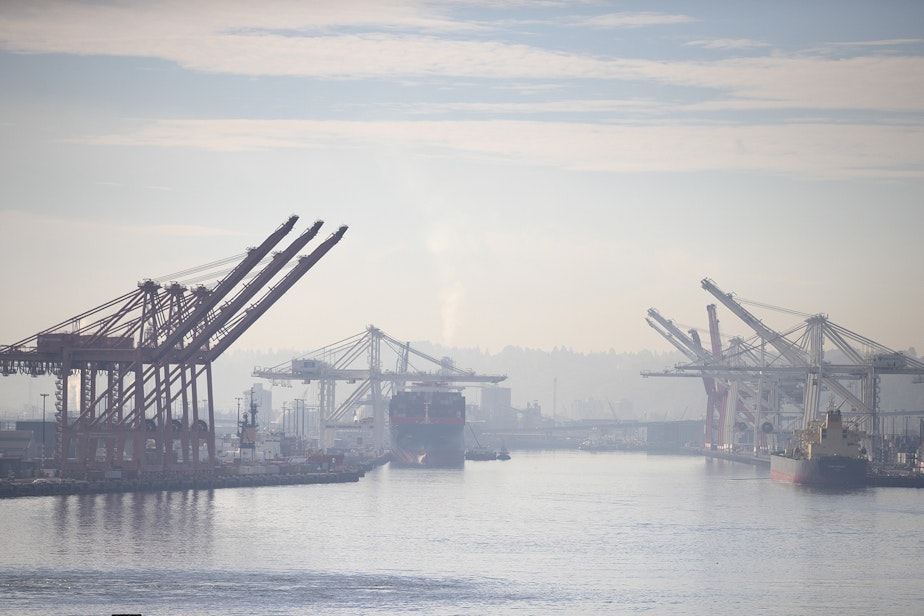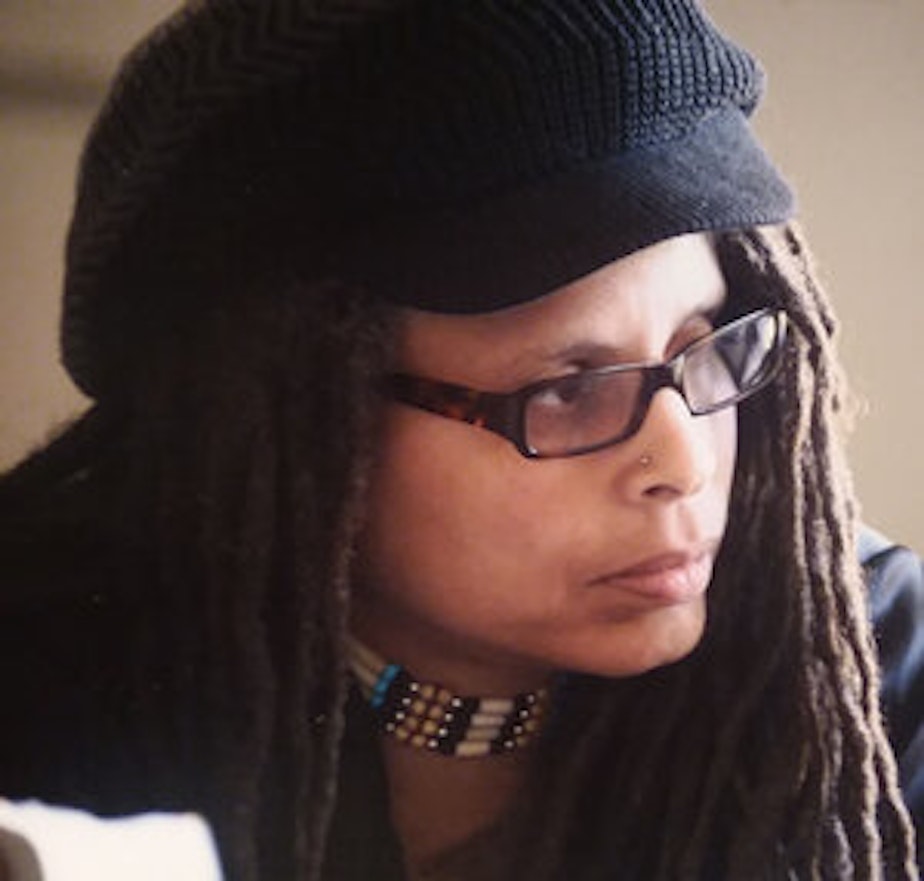I create myself, breathe lavender breath to escape the cage of my skin . . .

This essay is part of the Seismic — Seattle, City of Literature collection. Register for the September 15 release party.
I
I create myself, breathe lavender breath to escape the cage of my skin . . .
I wrote this line before I knew I would walk through a city called Seattle, before I knew I would step over squares of lavender light in its sidewalk. For years, I ignored them—squares cut into concrete to let the sun reach the underground, to let the sun into what remained after the fire. Perhaps my poem was prophesy, perhaps it was ghost, holy and waiting for me. If you are quiet enough, you can hear the past and future here in Seattle. Shhh. Do you hear the longhouse stories told by the People of the Lake, before we came (all the we that is not them, that is not Duwamish). Shhh. We are walking on Lushootseed words, like the early grass, like the rattle of the camas flower dried in the wind. We walk on a city that was and is and will be. Any city that comes through fire has its own holiness. Any city that walks on water carries cathedrals inside.
II
Are we the most unchurched city—this City of Literature?
Sponsored
JESUS CHRIST MADE SEATTLE UNDER PROTEST—that is what I was told when I moved here and lost my way. It’s a mnemonic for the pairing of downtown streets—Jefferson and James, Cherry and Columbia, Marion and Madison, Seneca and Spring, Union and University, Pike and Pine. “Memorize it,” a stranger told me when I asked for directions. “No one is from here. No one knows where things are.”
Below our feet, whether we know it or not, every Seattle writer, every Seattle reader walks on stories. We walk on mountains pushed into the sea. Seattle, unchurched? Doesn’t every place have a spirit? Literature is a cathedral. Cathedral—the Latin word is seat.
III
Literature is a seat on Broadway—on Capitol Hill. August Wilson sat at the Broadway Grill, wrote plays on the backs of flyers, and at B&O Espresso, he lingered. Was he there when it felt like I was in a version of Paris that I could afford? Did you see him? When he moved here, was Seattle still second in the nation for theaters, for playwrights, right behind New York?
Literature is a seat. At Café Septieme, with its red walls and white butcher paper tabletops stained with ideas and circles of coffee marks, the biscuits and mimosas were sacraments before conversations that were first drafts of poems and love affairs. Stories sashayed by, pretending to be villanelles, or stopped to peck your cheek and be gone like haiku written in the Panama Hotel. Yes, it is the Hotel on the Corner of Bitter and Sweet.
Sponsored
IV
Literature is a seat, the one left behind when you are rounded up and interned. It is a historic landmark. It is a cathedral. It is a brothel after the fire. Literature is an alley, a rusted car in an open field. It is a Triggering Town.
Literature is a rebellion, it is tear gas, it is a madrona tree, peeling. Literature is a forest. It is a ripple through deep dark brown bark. It is a pierced tongue; it is green hair, literature; it is a triple-shot espresso and it is a seat, a seat, a seat, a cathedral of scented words, like lavender squares just above something that was always there and has never been there before. Literature is a dropped call along the rise of Columbian Way from Rainier Avenue. It is the Mountain, her snowy skirt pretending not to hide fire. Literature is ashes near the playset. It is an unopened umbrella in the rain.
V
for a soul that dangles off the edge of a continent
From the porch of Hugo House, an old wooden building that we knew was haunted—I mean why wouldn’t it be? It was a funeral parlor. We all said there was a baby’s coffin above the stairwell to the basement. There was an archive in that raw cool room underground; it held every word somebody didn’t want to wait to hear was valid. The Zine Library WAS AS REVOLUTIONARY AS the second Battle in Seattle when tear gas clouded the fields of Cal Anderson Park, the police in riot gear pushing the WTO protesters up to Broadway on Capitol Hill, and to where the KFC was. From that porch at the edge of the continent, men who stayed sober so they could come inside and sit at the library in Hugo House looked out for you until nightfall, then they crawled into bottles and porch talk before sleeping bags—well, it doesn’t matter, right? They are cathedrals.
Hugo House lived up, in subtle ways, to its reputation as being haunted. From the top step of the front porch, if I paused long enough on my way in/on my way out I could see the coming ghosts of bookstores disappearing. I could see the coming ghosts and like the streets of downtown they are still there, lights underground, coming ghosts of bookstores disappearing the replacement of home-style cafes where you barely felt like you had left your house and somehow ran into everyone you knew. I could see the coming ghosts. Should I tell you about the literary ground we walk on like lavender glass squares cut into the sidewalk? A whole city of literature underground—you’ll have to take a tour, look for the headstones of Red and Black Books, Bailey/Coy Books, M. Coy Books, the bigger version of Twice Sold Tales with cats and books.
VI
On the bookcase next to my writing chair is a coaster I have been carrying around since I was a teenager. It depicts Basilica Sainte-Anne-de-Beaupré, a cathedral in Quebec. Twin Spires, the Romanesque entries of three large doors say holy words are spoken here. I come from Philadelphia, a city defined by cobblestones and connections to our country’s history; colonial pantheons. I have often looked at Seattle and bemoaned the lack of distinguishing architecture with the exception of the Space Needle. Some would say Smith Tower.
Literature is a cathedral. A cathedral is a seat. Here sits the spirit of revolution in Red and Black Books on 15th across from where the Rite Aid is now. Here sits the spirit of Dorothy Allison unfolding as we sat in folding chairs at Bailey/Coy Books on Broadway, where we floated after writing napkin poems at brunch or paused at the A-frame sign with a literary who-wrote-it and the promise of a book discount if you knew.
Sponsored
VII
Seattle is not a place of stone cathedrals. We are not noted for ancient hallows, but there is something sanctified about Seattle. It is a house for words. And words—as former Washington State Poet Laureate Elizabeth Austen says with the title of her work—words are Skin Prayers. Here, we are the stories made flesh.

The City of Seattle’s 2019–21 Civic Poet, Jourdan Imani Keith is a storyteller, essayist, playwright, naturalist and activist. A student of Sonia Sanchez, her TEDx Talk, “Your Body of Water,” the theme for King County’s 2016–18 Poetry on Buses program, won an Americans for the Arts award. Her poetry is largely anthologized and was long-listed by Danez Smith for the Cosmonauts Avenue poetry prize. Keith’s Orion Magazine essays “Desegregating Wilderness” and “At Risk” were selected for the Best American Science and Nature Writing 2015 anthology. She has been awarded fellowships from Hedgebrook, Wildbranch, the Santa Fe Science Writing Workshop, VONA and Jack Straw. Her memoir in essays is forthcoming from University of Washington Press.
